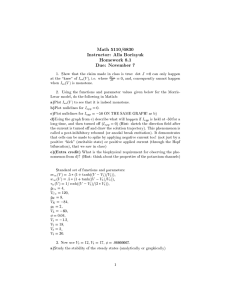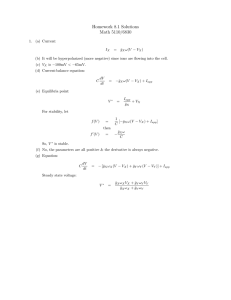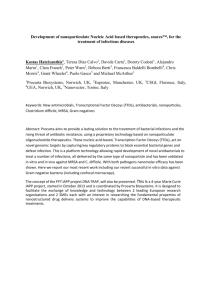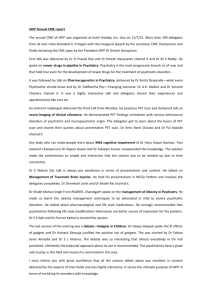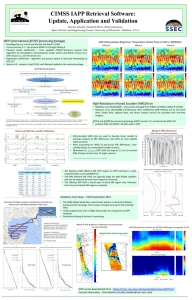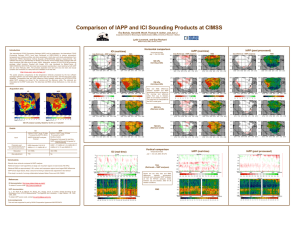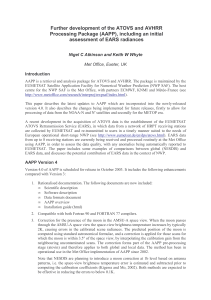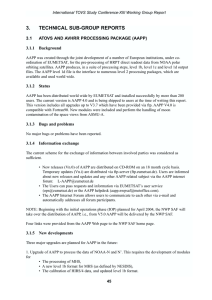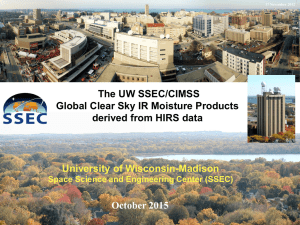Near Real Time Level-2 Products Via Direct Broadcast Using the
advertisement
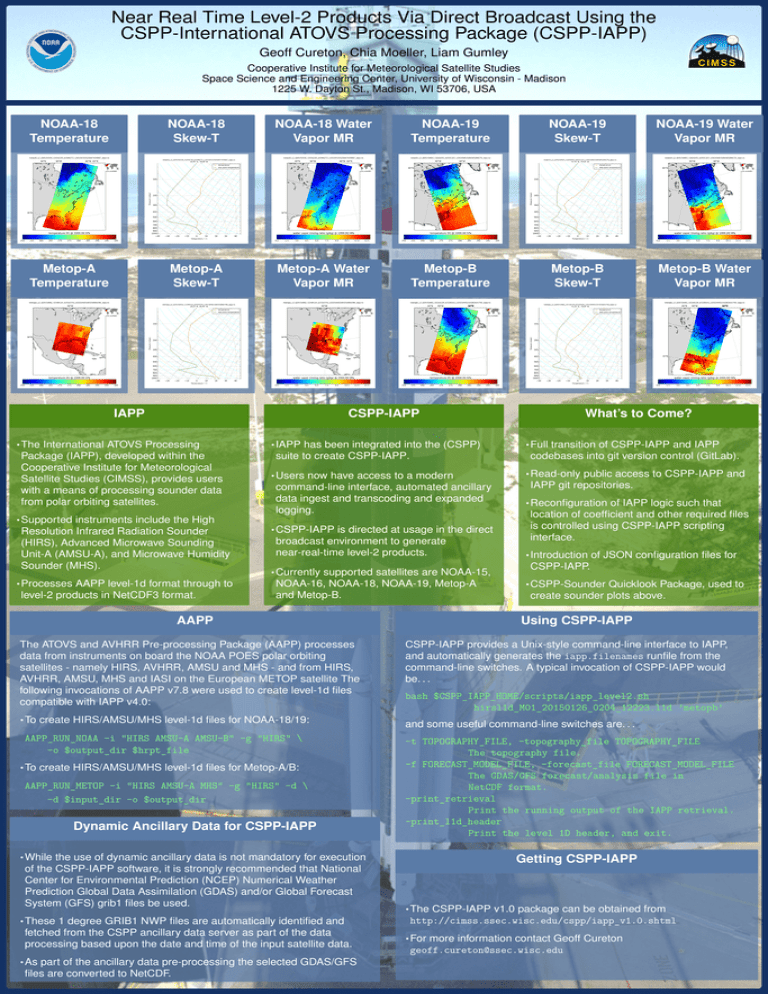
Near Real Time Level-2 Products Via Direct Broadcast Using the CSPP-International ATOVS Processing Package (CSPP-IAPP) Geoff Cureton, Chia Moeller, Liam Gumley Cooperative Institute for Meteorological Satellite Studies Space Science and Engineering Center, University of Wisconsin - Madison 1225 W. Dayton St., Madison, WI 53706, USA NOAA-18 Temperature NOAA-18 Skew-T NOAA-18 Water Vapor MR NOAA-19 Temperature NOAA-19 Skew-T NOAA-19 Water Vapor MR Metop-A Temperature Metop-A Skew-T Metop-A Water Vapor MR Metop-B Temperature Metop-B Skew-T Metop-B Water Vapor MR IAPP CSPP-IAPP • The International ATOVS Processing Package (IAPP), developed within the Cooperative Institute for Meteorological Satellite Studies (CIMSS), provides users with a means of processing sounder data from polar orbiting satellites. • IAPP has been integrated into the (CSPP) suite to create CSPP-IAPP. • Processes AAPP level-1d format through to level-2 products in NetCDF3 format. • Users now have access to a modern command-line interface, automated ancillary data ingest and transcoding and expanded logging. • CSPP-IAPP is directed at usage in the direct broadcast environment to generate near-real-time level-2 products. • Currently supported satellites are NOAA-15, NOAA-16, NOAA-18, NOAA-19, Metop-A and Metop-B. AAPP The ATOVS and AVHRR Pre-processing Package (AAPP) processes data from instruments on board the NOAA POES polar orbiting satellites - namely HIRS, AVHRR, AMSU and MHS - and from HIRS, AVHRR, AMSU, MHS and IASI on the European METOP satellite The following invocations of AAPP v7.8 were used to create level-1d files compatible with IAPP v4.0: • To create HIRS/AMSU/MHS level-1d files for NOAA-18/19: AAPP_RUN_NOAA -i "HIRS AMSU-A AMSU-B" -g "HIRS" \ -o $output_dir $hrpt_file • To create HIRS/AMSU/MHS level-1d files for Metop-A/B: AAPP_RUN_METOP -i "HIRS AMSU-A MHS" -g "HIRS" -d \ -d $input_dir -o $output_dir Dynamic Ancillary Data for CSPP-IAPP • While the use of dynamic ancillary data is not mandatory for execution of the CSPP-IAPP software, it is strongly recommended that National Center for Environmental Prediction (NCEP) Numerical Weather Prediction Global Data Assimilation (GDAS) and/or Global Forecast System (GFS) grib1 files be used. • These 1 degree GRIB1 NWP files are automatically identified and fetched from the CSPP ancillary data server as part of the data processing based upon the date and time of the input satellite data. • As part of the ancillary data pre-processing the selected GDAS/GFS files are converted to NetCDF. • Full transition of CSPP-IAPP and IAPP codebases into git version control (GitLab). • Supported instruments include the High Resolution Infrared Radiation Sounder (HIRS), Advanced Microwave Sounding Unit-A (AMSU-A), and Microwave Humidity Sounder (MHS). What’s to Come? • Read-only public access to CSPP-IAPP and IAPP git repositories. • Reconfiguration of IAPP logic such that location of coefficient and other required files is controlled using CSPP-IAPP scripting interface. • Introduction of JSON configuration files for CSPP-IAPP. • CSPP-Sounder Quicklook Package, used to create sounder plots above. Using CSPP-IAPP CSPP-IAPP provides a Unix-style command-line interface to IAPP, and automatically generates the iapp.filenames runfile from the command-line switches. A typical invocation of CSPP-IAPP would be. . . bash $CSPP_IAPP_HOME/scripts/iapp_level2.sh hirsl1d_M01_20150126_0204_12223.l1d ’metopb’ and some useful command-line switches are. . . -t TOPOGRAPHY_FILE, –topography_file TOPOGRAPHY_FILE The topography file. -f FORECAST_MODEL_FILE, –forecast_file FORECAST_MODEL_FILE The GDAS/GFS forecast/analysis file in NetCDF format. –print_retrieval Print the running output of the IAPP retrieval. –print_l1d_header Print the level 1D header, and exit. Getting CSPP-IAPP • The CSPP-IAPP v1.0 package can be obtained from http://cimss.ssec.wisc.edu/cspp/iapp_v1.0.shtml • For more information contact Geoff Cureton geoff.cureton@ssec.wisc.edu
